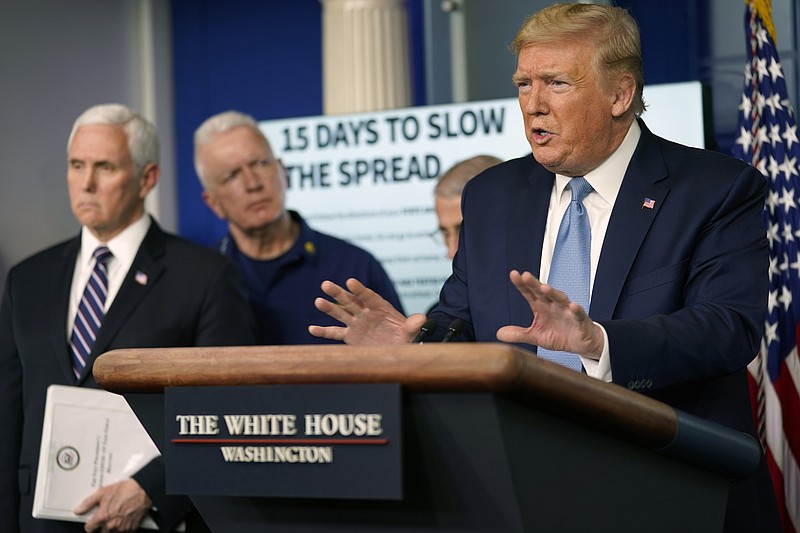If President Donald Trump appeared today to announce a cure for the coronavirus, the national media would fault him for keeping them in the dark, for taking a victory lap by making the announcement himself or by saying the announcement was timed so the roaring economy wouldn't falter.
We exaggerate a little, but not much.
If one constantly stayed tune to the national media, one would not think Trump had done anything right about the virus.
But national experts praised his early bans on travel from China and Europe.
Indeed, former White House physician Dr. Ronny Jackson said Trump's "quick and decisive actions" are likely to keep the virus from spreading in the United States as it has in other places.
"What's going on in Italy and Iran is not going to happen here I think," he said on the Fox News show "Hannity." "I think we are going to be more in line with what's going on in South Korea and things of that nature.
"We are going to see that we got on it early the president stopped it quickly," Jackson added, "and it's going to save countless American lives. I am proud that he's acted so quickly and decisively in all of this."
We should all, regardless of party, hope he is right.
Trump, for sure, finally is treating the coronavirus with the seriousness it deserves. Up to now, the national media would have preferred he prepared the country for an apocalyptic future rather than saying it is "something we have tremendous control of."
We have long despaired of the president's wording on some issues, and in this case his early, overzealous wording of confidence may have hidden the serious work related to the virus going on behind the scenes.
Of course, it doesn't help Trump when the likes of a member of The New York Times editorial board are intentionally spreading social media lies about his response to the virus.
On Monday, Mara Gay tweeted, "Trump told governors this morning they are on their own: 'Respirators, ventilators, all of the equipment - try getting it yourselves,' Mr. Trump told the governors during the conference call, a recording of which was shared with The New York Times."
Heartless of the president, right?
Well, a link in Gay's tweet to the newspaper's updates on the virus spelled out the truth.
"Mr. Trump told a group of governors that they should not wait for the federal government to fill the growing demand for respirators needed to help people diagnosed with coronavirus," the dispatch said. The president then said the words Gay tweeted.
"We will be backing you, but try getting it yourselves," he added, according to the dispatch. "Point of sales, much better, much more direct if you can get it yourself."
It was a sin of omission by Gay but a deliberate sin of omission.
Meanwhile, at a televised news conference Monday, Trump had dropped the "we've-got-this" tone. While saying "we will rally together as one nation, and we will defeat the virus," he nevertheless laid out the importance of not gathering in groups of more than 10 people, stated a vaccine had entered its first human trial and admitted social distancing could extend into the summer.
When he did, White House media kept repeating the timeline as if he were stating for a fact it wouldn't end until July or August. Finally, he and aides had to reiterate that he was suggesting a worst-case scenario, not what might likely happen.
The same was true about a query whether the virus crisis was sending the country into a recession. "It may be," Trump said, adding that the end of the virus could make the economy bounce right back. He'd used the word "recession," though, a word that is likely to be parroted back from a national media hopeful a recession could help elect a Democrat in the fall.
In those exchanges can be seen the national media's typical responses to Trump since he announced his candidacy for president in 2015: Forget the central fact of what is being stated and concentrate on something controversial, something said on conjecture (like the waning of the virus or a recession), or the way or manner in which something was said.
Yes, the president didn't help himself by falling for a question about how he would rate himself in his response to the crisis - an undeserved 10 out of 10, of course, when he should have said he wouldn't answer such a foolish question.
But it wouldn't have mattered what Trump said in the eyes of the national media, even in this Sunshine Week, which highlights the importance of open government laws and access to public records. It would have been wrong.
Going forward, at least in regard to the virus (but other things, too), he should stick to the facts and his experts. Together, they offer the country the best solution in dealing with the crisis.
